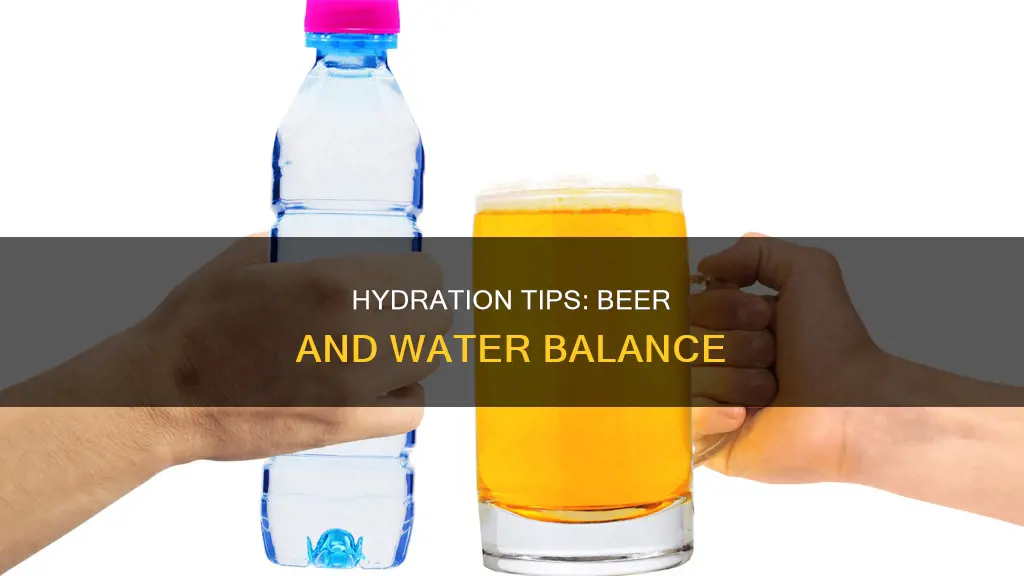
Drinking beer can be fun, but it can also leave you dehydrated. Alcohol is a diuretic, which means it makes you pee more often than usual. This can lead to mild dehydration, causing symptoms like thirst, fatigue, and headaches. To prevent this, it's important to drink water while consuming alcohol. But how much water is enough? Some people suggest drinking one glass of water for every alcoholic beverage, while others recommend drinking four times as much water as alcohol. However, the amount of water you need to drink may depend on various factors such as body weight, gender, and personal tolerance to diuretic effects. Ultimately, the best way to avoid dehydration and a hangover is to drink in moderation or avoid alcohol altogether.
What You'll Learn

Drink a glass of water after each alcoholic drink
Drinking a glass of water after each alcoholic drink is a good way to prevent a hangover. This method slows down your drinking, ensuring you consume less alcohol overall. It also helps you stay hydrated—alcohol is a diuretic, which means it makes you pee more often, stripping your body of water and electrolytes.
The diuretic effect of alcohol and the dehydration it causes contribute to the discomfort of a hangover. Dehydration can cause headaches, as it can shrink your water-based brain tissue, creating painful pressure inside your skull. It can also lead to symptoms such as thirst, fatigue, and anxiety.
Drinking a glass of water after each alcoholic drink is a simple and effective way to combat dehydration and its associated symptoms. It is important to note that drinking water will not affect your Blood Alcohol Content (BAC) or how intoxicated you feel. However, it will help reduce the negative effects of alcohol on your body, such as dehydration, and might make you feel like a genius the morning after.
It is worth noting that there are other factors that influence dehydration and hangover symptoms, such as body weight, gender, age, health, and how much you've had to eat or drink before consuming alcohol. However, drinking a glass of water for each alcoholic drink is a good rule of thumb to follow and will likely have a positive impact on how you feel, both during and after drinking.
So, the next time you plan to consume alcohol, remember to keep a glass of water handy and alternate between your drinks. Your body will thank you for it!
Understanding Beer Servings: How Much Is One Drink?
You may want to see also

Alcohol is a diuretic
This frequent urination can disrupt your sleep, on top of the effect alcohol has on the restorative REM stage of sleep. Therefore, cutting back on alcohol before bed can help you wake up feeling more rested.
Alcohol's diuretic effect can lead to dehydration, which is more likely in hot weather. Dehydration can become serious and lead to confusion and seizures, so it's important to replace lost fluids by drinking water. Dehydration can also worsen hangover symptoms, such as feeling thirsty, dizzy, lightheaded, tired, and experiencing a dry mouth and lips.
The only way to avoid the diuretic effect of alcohol is to not drink any at all. To avoid dehydration, make sure you replace lost fluids with water. It's recommended to drink a glass of water after each alcoholic beverage.
Elizabeth Warren's Beer: Did She Drink?
You may want to see also

Dehydration causes hangovers
Drinking alcohol can lead to dehydration, which is one of the main causes of a hangover. Alcohol is a diuretic, which means it makes you pee more often than you usually would. This leads to a loss of water and electrolytes from the body, resulting in dehydration. Dehydration can cause various hangover symptoms such as thirst, weakness, dry mouth and nose, dizziness, and lightheadedness.
The diuretic effect of alcohol is influenced by various factors, including your Blood Alcohol Content (BAC), body weight, the amount you drink, how full your stomach is, your personal tolerance to diuretic effects, age, and gender. These factors determine the extent of dehydration and its impact on hangover symptoms.
To prevent dehydration and mitigate hangover symptoms, it is recommended to stay hydrated while drinking. This can be done by alternating between alcoholic beverages and water or choosing drinks with a lower alcohol content or added water. Eating hydrating fruits and vegetables can also help maintain hydration levels.
While drinking water is essential, it may not completely prevent dehydration during alcohol consumption. This is because the dehydrating effects of alcohol are related to its concentration in the bloodstream. Alcohol decreases the sensitivity of the kidney's collecting ducts to the Anti-Diuretic Hormone (ADH), which normally reabsorbs water from urine. As a result, the urine becomes more dilute, and water is lost from the body.
In summary, dehydration caused by alcohol consumption is a significant contributor to hangovers. To minimize the impact of dehydration on hangover symptoms, it is essential to stay hydrated by drinking water and choosing lower-alcohol beverages. However, due to the complex mechanism of alcohol's diuretic effects, staying hydrated may not entirely prevent dehydration during alcohol consumption.
Drinking Beer Legally in Dry Counties: What's Allowed?
You may want to see also

Water helps flush out toxins
Water is an essential component of human life. It is necessary for maintaining proper bodily functions, and it becomes even more critical when one consumes alcohol. Drinking water after drinking beer has several benefits, one of which is that it helps flush out toxins from the body.
When one consumes alcohol, the body becomes dehydrated. This dehydration is caused by the diuretic effect of alcohol, which makes one urinate more frequently. This diuretic effect is due to the decrease in the sensitivity of the kidney's collecting ducts to the anti-diuretic hormone (ADH). ADH is responsible for increasing the number of channels that reabsorb water from urine as it passes out of the nephron. By reducing these channels, the urine becomes more diluted, and water is lost from the body. This loss of water leads to dehydration, which can cause symptoms such as thirst, fatigue, and headaches.
Drinking water after consuming beer helps to counteract this dehydration. It replaces the lost fluids and helps the body flush out the toxins produced during alcohol metabolism. Alcohol metabolism in the liver produces a compound called acetaldehyde, which contributes to inflammation in the liver, brain, gastrointestinal tract, and other parts of the body. By staying hydrated, one can promote the excretion of these toxins and reduce their harmful effects on the body.
In addition to flushing out toxins, drinking water after beer can also help reduce the severity of a hangover. Hangovers are caused by multiple factors, including inflammation, mild dehydration, disrupted sleep, and gastrointestinal issues. By staying hydrated, one can mitigate the effects of dehydration, which is a significant contributor to hangover symptoms. Water also helps to replenish electrolytes lost due to frequent urination, reducing the symptoms of a hangover, such as headache and fatigue.
To effectively combat dehydration and flush out toxins, it is recommended to drink one glass of water for every alcoholic beverage consumed. This practice helps to slow down drinking and ensures adequate hydration. However, it is important to note that drinking water will not completely prevent a hangover, especially if one consumes excessive amounts of alcohol. The best way to avoid a hangover is to drink in moderation or avoid alcohol altogether.
Hipsters and Craft Beer: A Cultural Obsession?
You may want to see also

Water protects your skin
There is no simple answer to how much water one should drink after consuming beer. This is because the dehydrating effects of alcohol depend on several factors, including your Blood Alcohol Content (BAC), body weight, the amount of food in your stomach, and personal tolerance to diuretic effects. However, a good rule of thumb is to alternate between an alcoholic beverage and a glass of water, and to drink water before leaving home.
The skin plays a critical role in maintaining the body's overall hydration status. It acts as a waterproof barrier, preventing water loss through the skin and helping to regulate body temperature. The epidermis, the outermost layer of the skin, contains keratin and glycolipids, which give it hydrophobic properties, meaning it repels water and prevents dehydration.
Additionally, water helps in the transportation of nutrients, oxygen, and moisture to the skin through the blood. It also aids in removing toxins and waste from the body, supporting the skin's overall health and functionality.
While drinking water is crucial for skin health, it is essential to note that the relationship between water intake and skin appearance is complex. Simply drinking more water may not directly lead to the elimination of wrinkles or the reduction of pore size. However, proper hydration can improve the skin's overall tone and elasticity, making it appear more youthful and vibrant.
Beer and Clonazepam: Safe Mix or Health Risk?
You may want to see also
Frequently asked questions
There is no simple answer to this question as it depends on many factors, including your body weight, gender, and how much you've had to drink. However, a good rule of thumb is to drink one glass of water for every alcoholic drink you consume.
Alcohol is a diuretic, which means it makes you urinate more frequently, leading to dehydration. Drinking water helps to rehydrate your body and reduce the negative effects of alcohol, such as headaches and fatigue.
It is important to start drinking water before you begin consuming alcohol. Alternating between alcoholic and non-alcoholic drinks can help you stay hydrated and slow down your alcohol consumption.
Yes, staying hydrated improves your mental capacity and helps your body flush out toxins and protect your skin.
If you experience symptoms such as thirst, fatigue, or a headache, it may be a sign that you are not drinking enough water to counteract the dehydrating effects of alcohol.







